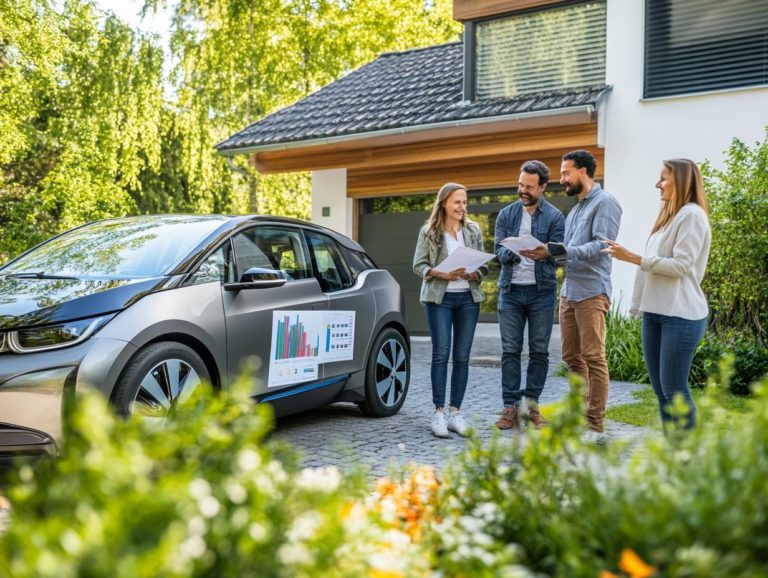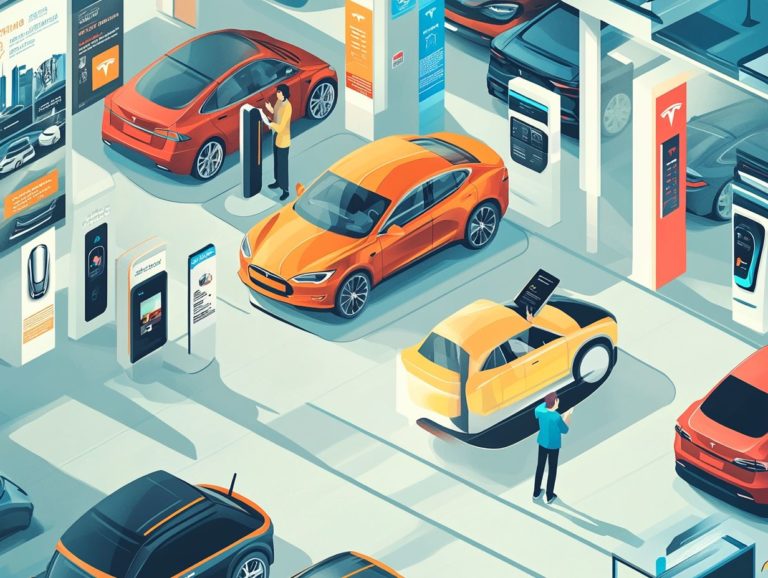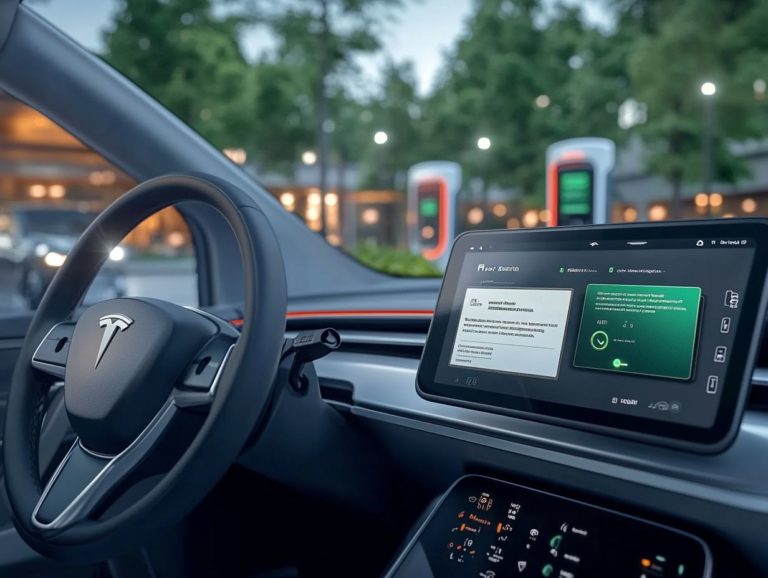Top 7 Mistakes to Avoid When Buying an EV
Thinking about making the switch to an electric vehicle (EV)? The transition comes with a host of benefits, but it’s crucial to navigate the process with care.
This article outlines the top seven mistakes you should avoid when purchasing an EV, from ignoring your driving habits to failing to research various models.
You’ll discover the advantages of owning an EV, debunk common myths, and receive valuable tips to make your transition smoother and more cost-effective.
Dive in to empower your EV journey!
Contents
- Key Takeaways:
- 1. Not Considering Your Driving Habits
- 2. Not Researching Different Models and Brands
- 3. Not Understanding the Charging Process
- 4. Not Factoring in the Cost of Maintenance
- 5. Not Taking Advantage of Incentives and Tax Credits
- 6. Not Planning for the Future
- 7. Not Consulting with an Expert
- What Are the Benefits of Owning an Electric Vehicle?
- What Are the Key Features to Look for in an EV?
- How Can You Make the Switch to an EV More Affordable?
- What Are the Environmental Benefits of Owning an EV?
- How Can You Ensure a Smooth Transition to Owning an EV?
- Frequently Asked Questions
- What are the top 7 mistakes to avoid when buying an EV?
- Why is it important to research different EV models before making a purchase?
- How do my driving habits affect my EV purchase?
- What should I consider when it comes to charging options for an EV?
- How can I accurately calculate the true cost of ownership for an EV?
- Why is test driving an EV crucial before making a purchase?
- What future advancements in EV technology should I consider before buying?
Key Takeaways:

- Consider your driving habits when choosing an EV to ensure it meets your needs and lifestyle.
- Research different models and brands to find the best fit for you, taking into account factors like range, charging time, and price.
- Understand the charging process to avoid unexpected delays and expenses.
1. Not Considering Your Driving Habits
When you transition to electric vehicles (EVs), one of the most critical factors to consider is your driving habits. They play a significant role in determining how long your battery lasts, vehicle range, and overall performance.
For instance, if you frequently embark on short trips, you might find yourself increasing the number of charging cycles, which may prevent the battery from fully discharging and recharging. This can limit how much energy your battery can store, which is a big deal for performance! On the other hand, longer commutes can encourage deeper charging cycles that benefit battery health, as long as you manage your charging effectively.
It’s also important to monitor driving conditions, such as temperature fluctuations, which can accelerate battery wear. By adopting optimal practices like combining errands into a single trip or using regenerative braking you can mitigate these effects. This will help extend the lifespan of your EV’s battery, ensuring reliable performance for years to come.
2. Not Researching Different Models and Brands
Failing to explore various models and brands could mean missing out on the perfect electric vehicle tailored to your needs, whether it s the stylish Tesla Model Y, the functional Kia Soul, or the impressive Kia EV6.
By taking the time to compare features such as battery capacity, range, and charging recommendations, you can effectively navigate the ever-evolving landscape of electric vehicles. Each model brings its own unique advantages, and grasping these distinctions is essential for making a well-informed choice.
Paying attention to manufacturer guidelines significantly impacts vehicle design and technology. These guidelines not only enhance performance and efficiency but also prioritize safety and longevity.
Recognizing these factors helps you optimize your driving experience while selecting a vehicle that aligns perfectly with your lifestyle and charging habits.
3. Not Understanding the Charging Process
Understanding the charging process is crucial for you as an electric vehicle owner; it plays a pivotal role in maintaining your battery’s health and optimizing charging cycles.
You will encounter various types of charging stations. Level 1 provides a slow charge, ideal for overnight use at home, while Level 2 offers a significantly faster charge, commonly found in public charging locations. If you re looking for a quick recharge, DC fast charging stations are your best friend, capable of delivering a substantial boost in just minutes.
These charging methods affect EV batteries in different ways, which is where battery management systems come into play. They diligently monitor charge levels and temperatures to ensure everything operates safely. To enhance your battery s longevity, it s wise to steer clear of practices like overcharging, which can diminish capacity over time, or deep discharging, which may compromise performance.
Adopting a thoughtful approach to charging can significantly extend the lifespan of your electric vehicle s battery, making it a top priority for any conscientious owner.
Start your electric journey today and enjoy the benefits of going green while saving money!
4. Not Factoring in the Cost of Maintenance
Electric vehicles bring a unique set of maintenance costs. Neglecting to consider the expenses associated with EV batteries can lead to unexpected financial surprises down the line.
Proper battery management is not just important; it’s essential for ensuring both longevity and reliability. Regularly check your energy consumption to find efficiency issues. Also, monitor temperature extremes and your charging habits to protect your battery s health.
For efficient maintenance, consider these tips:
- Schedule routine checks.
- Use recommended charging stations.
- Monitor your usage patterns.
Stick to safety standards now! Avoid overcharging and keep your vehicle within its limits for top performance. By taking these proactive steps, you’ll enjoy a more reliable and cost-effective electric vehicle experience.
5. Not Taking Advantage of Incentives and Tax Credits
Many prospective electric vehicle owners overlook substantial savings by not capitalizing on the incentives and tax credits available to encourage the adoption of electric and plug-in hybrid vehicles (PHEVs).
These programs manifest in various ways, including federal tax credits that can provide you with up to $7,500 off the purchase price, contingent upon the vehicle’s battery capacity. State-specific incentives may offer extra rebates, tax breaks, and exemptions from certain fees. Some states even provide grants or reduced registration fees for EV owners.
By seizing these financial opportunities, you can significantly reduce the overall cost of ownership, making the shift to electric driving not only an environmentally responsible choice but also a financially savvy one.
6. Not Planning for the Future

Failing to plan for future developments in electric vehicle technology can significantly hinder your investment, affecting key factors such as battery technology, energy efficiency, and overall vehicle weight.
As battery technology and charging solutions improve quickly, staying informed about these trends becomes essential for you as an electric vehicle owner.
Keeping an eye on the latest innovations not only elevates your driving experience but also ensures that your vehicle remains at its peak performance.
Understand potential upgrades to make smart choices that maximize your investment!
Anticipating changes in battery capacity and efficiency allows you to better prepare for the transition to the next generation of electric vehicles, ensuring both compatibility and cost-effectiveness in your journey ahead.
7. Not Consulting with an Expert
Consulting with an expert in electric vehicles offers you invaluable insights into battery management, maintenance tips, and adherence to safety standards all of which are crucial for prolonging battery longevity.
These professionals don t just specialize in vehicle design; they also possess extensive knowledge of the latest battery technologies. By seeking their guidance, you can gain a clearer understanding of how your vehicle operates, including effective strategies for getting the best out of battery performance.
Certified consultants can provide personalized advice that addresses your unique concerns and preferences. This expertise can be especially beneficial if you’re new to electric vehicles or looking to maximize your investment, ensuring a smoother and more efficient driving experience.
What Are the Benefits of Owning an Electric Vehicle?
Owning an electric vehicle (EV) offers a wealth of benefits that elevate your driving experience. Enjoy lower energy costs and less maintenance while helping the planet! You ll likely notice that your energy costs are significantly lower compared to traditional gasoline vehicles, translating to impressive savings at the pump.
The maintenance requirements for EVs are generally less demanding, thanks to fewer moving parts. This leads to further reductions in overall vehicle upkeep expenses. This enticing combination makes electric vehicle ownership a compelling choice for those mindful of their budgets.
Beyond the financial perks, the environmental benefits are truly noteworthy. EVs help decrease your carbon footprint and contribute to a cleaner atmosphere. The innovative technology that powers these vehicles enhances performance and maintains their eco-friendly edge, as advancements continue to improve efficiency and longevity.
How Can You Determine If an EV Is Right for You?
Determining whether an electric vehicle is the right choice for you requires a thoughtful evaluation of your driving habits and vehicle range needs. It s also important to have a solid grasp of current battery technology and its operational limits.
To make a well-informed decision, start by assessing your daily driving requirements. Consider the distances you typically cover and how often you embark on longer trips. Think about whether your lifestyle demands a long-range vehicle or if a smaller battery capacity would suffice for your short, frequent commutes.
Battery efficiency plays a key role in how far you can travel on a single charge. Also, reflect on the availability of charging stations in your area. If you live in a location with limited access to charging infrastructure, this could significantly impact your overall experience with an electric vehicle.
What Are the Common Myths About EVs?
Don’t let common myths hold you back from discovering the truth about electric vehicles! Misconceptions about range, battery performance, and charging cycles can create unnecessary barriers for potential buyers like yourself.
These misunderstandings often lead to unfounded fears, such as range anxiety the nagging worry that your electric vehicle won’t have enough power to get you to your destination. In reality, most modern electric vehicles boast impressive ranges, easily accommodating the daily commuting needs of the average driver. Many can travel over 250 miles on a single charge.
Today s charging times are faster than ever! Thanks to advancements in battery technology, you can recharge quickly at high-powered charging stations. Plus, maintenance costs for electric vehicles generally run lower than those for gasoline cars, thanks to fewer moving parts and the delightful absence of oil changes.
By tackling these misconceptions head-on, empower yourself to make informed decisions about stepping into the electric vehicle market.
What Are the Different Types of EVs?
Electric vehicles offer a range of options, including fully electric vehicles (BEVs), plug-in hybrid electric vehicles (PHEVs), and those using various battery technologies like lithium-ion batteries. Each type is designed to cater to your unique preferences and driving needs.
Take BEVs, for example; they run entirely on electric power, delivering zero emissions and a serene driving experience. This makes them perfect for someone like you who is environmentally conscious.
On the other hand, PHEVs combine traditional internal combustion engines with electric drivetrains. This hybrid approach gives you the flexibility to switch between electric and gasoline power, which can be particularly beneficial for those longer journeys.
As technology advances, innovations in battery solutions, such as solid-state and lithium-sulfur options, are improving vehicle efficiency and extending range. However, it s essential to weigh the higher initial costs and concerns about battery lifespan as you consider the perfect electric vehicle to complement your lifestyle.
Explore your EV options today!
What Are the Key Features to Look for in an EV?
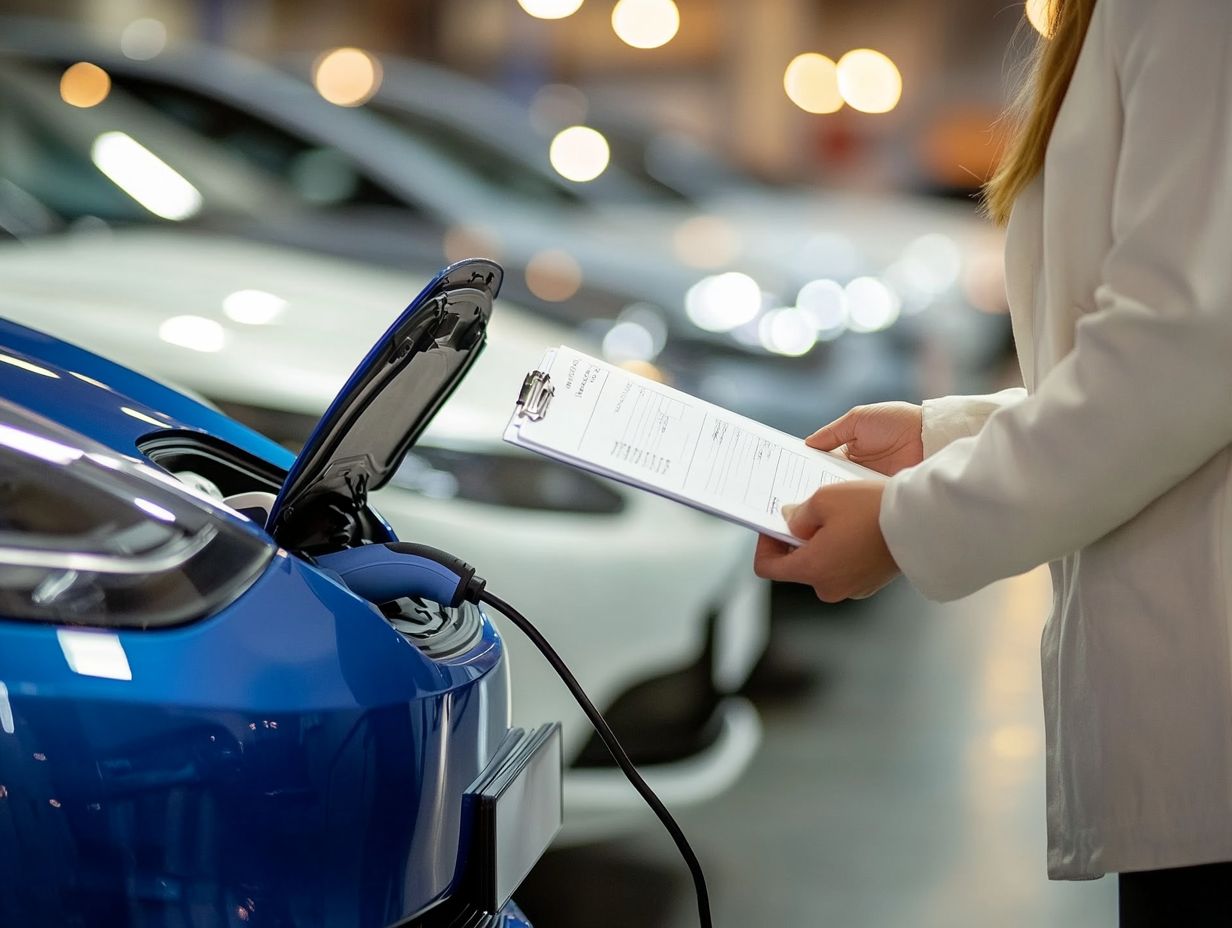
When selecting an electric vehicle, consider key features like battery capacity and overall vehicle range. These factors ensure optimal performance for your daily driving needs.
Battery longevity is essential. It affects how often your vehicle needs charging and its resale value down the line.
Performance metrics, including acceleration and handling, significantly shape your driving experience. Evaluating how the EV performs under various conditions is crucial.
Understanding these features empowers you to make informed decisions. This knowledge ensures your new vehicle integrates smoothly into your lifestyle and commuting habits.
How Can You Make the Switch to an EV More Affordable?
Switching to an electric vehicle can be affordable. Use available incentives and tax credits to save money and understand energy consumption to reduce costs over time.
Explore local, state, and federal programs that offer financial rebates for purchasing EVs. This can lighten the initial financial load of your investment.
Consider installing home charging stations. You may qualify for additional deductions or credits that enhance your savings.
You can also look at the lower operating costs. Comparing electricity rates to gasoline prices shows the ongoing advantages of going electric.
With a strategic approach to financial aid available and a keen awareness of energy efficiency, transitioning to an electric vehicle becomes a financially smart decision.
What Are the Environmental Benefits of Owning an EV?
Owning an electric vehicle offers remarkable environmental advantages. It primarily helps in reducing emissions and enhancing energy efficiency while contributing to a more sustainable future.
By choosing electricity as your clean energy source, electric vehicles drastically cut down greenhouse gas emissions compared to traditional gasoline-powered cars.
This transition combats harmful pollutants in our atmosphere and diminishes reliance on fossil fuels, which exacerbate climate change.
As more individuals make the switch to EVs, the collective impact significantly lowers overall carbon footprints. This shift helps mitigate the effects of global warming and aligns with broader sustainability efforts.
How Can You Ensure a Smooth Transition to Owning an EV?
Make your switch to an electric vehicle exciting and easy! You need to know how to take care of your battery and where to locate charging stations.
Establishing a home charging setup tailored to your needs is crucial. Investing in a Level 2 charger, a faster way to charge your car at home, can significantly reduce your charging time.
Explore apps and tools that guide you to nearby charging stations, especially for longer road trips.
Adopting new driving techniques, like using regenerative braking and optimizing your speed, boosts battery performance and extends your vehicle’s range.
As you adjust your routines and embrace this eco-friendly lifestyle, you ll find that transitioning to an EV is not only easy, but it s also a rewarding experience!
Are you ready to join the EV revolution? Start exploring your options today!
What Are the Long-Term Savings of Owning an EV?
Owning an electric vehicle opens the door to substantial long-term savings because of lower energy costs and reduced maintenance associated with EV batteries.
When you compare these advantages to the costs of traditional gas-powered vehicles, the benefits become clear. With electricity generally costing less than gasoline, your everyday driving becomes much easier on your wallet.
EVs typically require less routine maintenance, as they have fewer moving parts. This means fewer trips to the mechanic and ultimately lower repair bills over time.
The longevity of EV batteries contributes to these financial perks. Many modern batteries can last eight years or longer, allowing you to maximize your return on investment through sustained performance and efficiency.
What Are the Future Developments in EV Technology?
Future advancements in electric vehicle technology are set to unveil exciting innovations, particularly in battery technology, energy efficiency, and overall vehicle performance.
These innovations aim to create a seamless driving experience, making electric vehicles increasingly accessible and attractive to a wider audience. For example, advancements in systems that manage batteries improve longevity and cut charging times, effectively easing any range anxiety you might experience.
Ultra-fast charging solutions are poised to revolutionize how quickly electric cars can recharge, potentially reshaping the infrastructure landscape. Breakthroughs in vehicle design not only enhance aesthetics but also improve aerodynamics, contributing to better energy conservation.
Together, these developments promise exciting changes for electric vehicle ownership ones that could redefine your everyday transportation experience.
Frequently Asked Questions
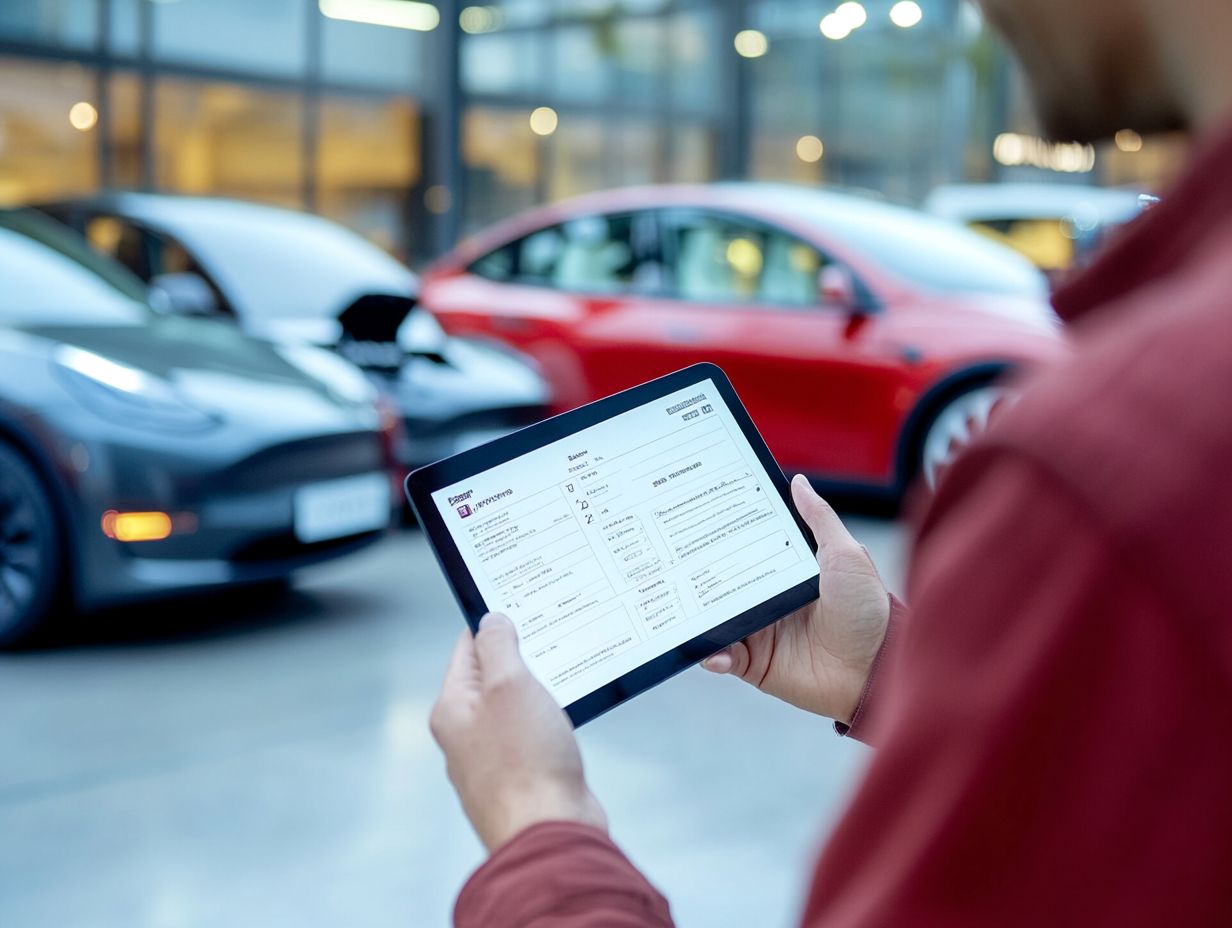
What are the top 7 mistakes to avoid when buying an EV?
The top 7 mistakes to avoid when buying an EV are: not researching different models, not considering your driving habits, not factoring in charging options, not calculating the true cost of ownership, not test driving the vehicle, not checking for available tax incentives, and not considering future advancements in EV technology.
Why is it important to research different EV models before making a purchase?
Researching different EV models allows you to compare features, prices, and driving ranges to find the best fit for your needs. This helps you avoid potential buyer’s remorse and ensures you end up with the right EV.
How do my driving habits affect my EV purchase?
Your driving habits, including your typical daily mileage and patterns, can affect the range and battery life of an EV. It s crucial to consider these factors to avoid purchasing an EV with insufficient range.
What should I consider when it comes to charging options for an EV?
When buying an EV, consider the availability of charging options in your area, including public stations and at-home charging. Lack of convenient options can significantly impact your overall EV experience.
How can I accurately calculate the true cost of ownership for an EV?
When purchasing an EV, consider not only the sticker price but also factors such as maintenance, insurance, and potential tax incentives. This gives you a clearer picture of the true cost of ownership.
Why is test driving an EV crucial before making a purchase?
Test driving an EV allows you to experience the driving feel, range, and overall functionality. This helps you avoid surprises or disappointments after your purchase.
What future advancements in EV technology should I consider before buying?
As EV technology evolves, consider future developments like increased driving ranges, faster charging times, and new features. This awareness can help you avoid buying an outdated model and ensure you maximize your EV s potential for years to come.
Explore more about electric vehicles or visit our website for additional information!

